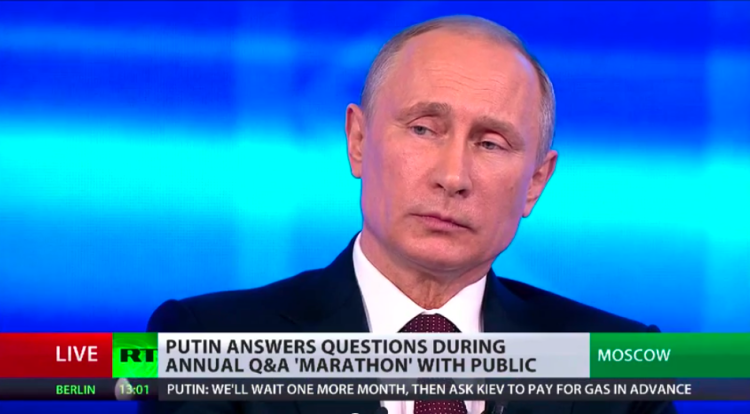Is Edward Snowden a gullible pawn for Russia’s security state or a savvy anti-surveillance activist? The former National Security Agency (NSA) contractor penned his own answer today.
In an op-ed in the Guardian newspaper today, Snowden said that he deliberately asked Russian President Vladimir Putin yesterday during a live TV show a question about mass surveillance “to lift a taboo on discussion of state surveillance before an audience that primarily views state media.”
He said he had hoped “that Putin’s answer – whatever it was – would provide opportunities for serious journalists and civil society to push the discussion further.”
Snowden appeared Thursday on TV monitors in the studio where a live question-and-answer session was taking place with Putin. He asked the ex-KGB agent:
“Does Russia intercept, store, or analyze, in any way, the communications of millions of individuals?”
“And do you believe that simply increasing the effectiveness of intelligence or law enforcement investigations can justify placing societies, rather than their [individual] subjects, under surveillance?”
In the Guardian, Snowden wrote that his questions mirrored the “now infamous exchange in U.S. Senate intelligence committee hearings between Sen. Ron Wyden (D-Ore.) and the director of national intelligence, James Clapper, about whether the NSA collected records of millions of Americans.” He added that “Clapper’s lie” became a “major motivating force behind my decision to go public.”
Putin replied yesterday to Snowden: “On a massive scale, on an uncontrolled scale, we certainly do not allow this, and I hope we will never allow it.” He added that such mass spying “cannot be in accordance with the law,” and, at any rate, “we do not have the money that they have in the States or the technical means” to do so.
The mics in the Russian studio did not pick up all of the jaws that were dropping in the outside world.
‘Ridiculous’
New York University professor Mark Galeotti, an expert on security services in Russian, told The Daily Beast that Putin’s reply was “ridiculous.” Russian journalist Andrei Soldatov, who covers Russian intelligence services, said that “Russian surveillance is much more intrusive than what you have in the United States.”
Both experts agreed that Russia – which has a long history of mass surveillance – does not have the funding and the tech that the U.S. does but that the nation more than compensates for this by such means as backdoor access to every telecom’s or Net service provider’s server, without having to ask permission of a special court, as is at least expected in the U.S.
Snowden acknowledged in his op-ed that Putin “denied the first part of the question and dodged on the latter.” He also noted that “systems are in place” in Russia to do mass surveillance, and that social media companies have reported “they have received bulk collection requests from the Russian government” — neither of which were mentioned in his questions.
For someone who has used journalists so brilliantly to release his documents – for which two publications recently received Pulitzers – Snowden’s op-ed shows a remarkable lack of understanding of journalistic positioning.
Coverage of him asking such questions of Putin – questions that do not cite known evidence of Russian surveillance – inevitably point out that he is a sponsored guest of the Russian government, totally dependent on Putin’s good graces to avoid prosecution.
And in saying that his questions were setup shots for follow-up by Russian journalists, Snowden may have demonstrated he is actually enjoying asylum in some alternate Russia, one where Putin does not arrest or threaten critical journalists with prosecution for treason.
VentureBeat's mission is to be a digital town square for technical decision-makers to gain knowledge about transformative enterprise technology and transact. Learn More

